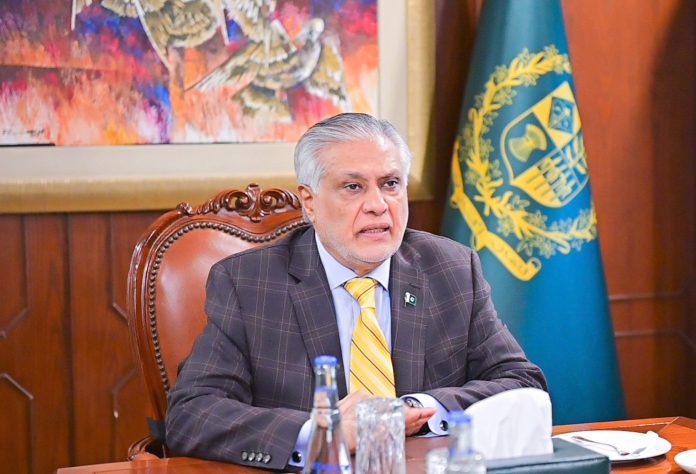ISLAMABAD, Aug 5 (Alliance News) – Deputy Prime Minister and Foreign Minister Ishaq Dar has raised alarm over media reports suggesting that the Modi-led Indian government is considering restoring statehood to Jammu while retaining the union territory status for Indian Illegally Occupied Jammu and Kashmir (IIOJK).
Dar made the remarks during a rally held in Islamabad on Tuesday to observe Youm-e-Istehsal, marking six years since India revoked the special constitutional status of Jammu and Kashmir on August 5, 2019. The rally, which began at the Ministry of Foreign Affairs and concluded at D-Chowk, was attended by officials, civil society members, and journalists to express solidarity with the oppressed people of Kashmir.
“On August 5, 2019, Jammu and Kashmir and Ladakh were declared as union territories. Now it is being said that Jammu will be granted statehood again,” Dar said while addressing the rally. Referring to recent Indian media reports, he noted that such a decision may be announced “in the next few hours or days.”
Dar criticized the potential move as “provocative, condemnable, and unacceptable,” warning that it would be another blow to the already suffering people of Kashmir and a continuation of New Delhi’s strategy to alter the demographic and political identity of the region.
The foreign minister’s remarks come amid heightened speculation in Indian media following a series of meetings between President Droupadi Murmu, Prime Minister Narendra Modi, and Home Minister Amit Shah. The meetings have fueled expectations that the government may announce a partial restoration of statehood to the region — specifically to Jammu — while keeping Kashmir under federal control.
Meanwhile, the Indian Supreme Court is set to hear a plea on August 8, demanding the restoration of full statehood to the IIOJK. Dar highlighted this context to show how internal decisions and court rulings in India cannot determine the fate of an internationally recognized dispute.
He asserted that the future of Jammu and Kashmir cannot be decided unilaterally by New Delhi through domestic legislation or legal manipulations. “Kashmir is an internationally recognised dispute and its resolution must come through the aspirations of the Kashmiri people and in accordance with United Nations Security Council resolutions,” he emphasized.
Dar reiterated Pakistan’s demand for India to reverse all illegal steps taken on and since August 5, 2019. He called upon New Delhi to immediately end the media blackout and military lockdown imposed in the region, stop its oppressive actions, and allow Kashmiri voices to be heard freely.
The foreign minister reaffirmed Pakistan’s unwavering diplomatic, political, and moral support to the Kashmiri people in their struggle for the right to self-determination. He stressed that Pakistan stands firmly with the people of Kashmir until they achieve their rightful and just cause.
While underscoring Islamabad’s commitment to peaceful coexistence, Dar also issued a stern warning. “Pakistan’s preference is dialogue and diplomacy, not confrontation. But our desire for peace should not be mistaken as weakness,” he said.
He recalled that Pakistan’s armed forces and its people are fully capable of defending the country against any aggression — referencing the Marka-e-Haq, the official name given by the Pakistan Army to a series of skirmishes and operations that took place between April 22 and May 10, following the Pahalgam attack.
Dar highlighted that during this operation, Pakistan displayed unity and resilience in the face of Indian military actions, demonstrating its readiness to protect its sovereignty and stand by the Kashmiri people under all circumstances.
Throughout the rally, speakers condemned the Indian government’s attempts to alter the identity, demography, and political landscape of the region. They also criticized the continued detention of Kashmiri leaders, suppression of local media, and restrictions on religious and political freedoms in the occupied territory.
Participants carried placards demanding justice for Kashmiris and chanted slogans against India’s illegal occupation. The event concluded with a pledge that Pakistan would continue to raise the Kashmir issue at all international forums, including the United Nations, the Organisation of Islamic Cooperation (OIC), and other global platforms.
Youm-e-Istehsal is observed across Pakistan each year to mark the revocation of Articles 370 and 35A of the Indian Constitution by the BJP government, which granted special status to Jammu and Kashmir. Since then, Pakistan has consistently called the move a violation of international law and has sought to galvanize international opinion in support of the Kashmiri cause.
Pakistan’s leadership, including the president and the prime minister, issued statements on the occasion, reaffirming the country’s unshakable commitment to the people of IIOJK and demanding that the international community hold India accountable for its actions.






